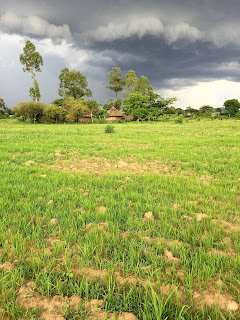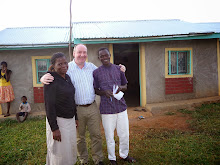Monday saw the spring equinox, when the sun is directly
over the equator, when the days last from 6am to 6pm and life is at its hottest in Kisumu. Moses and I had travelled the
roads of Nyanza and Western Provinces, meeting up with some of our older boys
& girls, now young men and women.
But today, with the sun still high in the sky, burning
down on the beautiful gardens of Sunset Hotel, we had planned to swim.
We arranged to meet at 11:00, to give the sun time to
rise above the Yellow Oleander, the purple Jacaranda and the red Flame
trees that line the grounds of the hotel and to warm the waters of the pool
from the relative cool of the night air.
At midday they hadn’t arrived, so I went down and slipped
into the pool. It was a perfect temperature. I swam through the calm waters,
surreptitiously avoiding the many insects, both large and small, that had
succumbed to the pools watery depths, enjoying a little down time in what had
been a hectic week.
I swam a few lengths of the small pool, then stood for a
while in the water, watching the many coloured birds in the trees above. Below
the pool, beyond the grounds of the hotel, I watched a pair of zebra wander
through the trees with a few small impala for company.
As I sat, submerged in the cool depths, I saw Moses and the
children coming down the path at the hotel above. I waved and he waved back,
then led the children down to the pool.
We paid the fee for visitors and the children quickly
changed before heading into the shallow waters of the pools short end.
It was lovely to see them all. I had met a few of them at
Kibos on Sunday when we had gone to church, but we had rushed away to get to
Kachok, to attend the service there too, so I hadn’t spent time with the
children at the house. Dennis and James, two of the more confident swimmers,
were soon jumping from the diving board at the deep end of the pool, their
splashes rippling across the water and drowning those who were paddling.
Malenya (or “Wayne” as he is known in the house, though
nobody could tell me why!) is the smallest of the new boys at Kibos, he is 8
years old. Wayne lost his mum in a tragic accident when he was just five. She
was lighting a paraffin stove to cook food for the family when the stove
exploded and she was very badly burned. After a short while in hospital she died
of her injuries, leaving Wayne alone. His father fled and hasn’t been seen since. We
don’t know why he left, but it is an all too common occurrence that children
are abandoned by single parents who can’t face the responsibility to bring them
up.
Wayne went to live with a distance relative in Kondele,
though he wasn’t put into school, the family making him work in the house,
looking after their own, younger child. Regularly beaten when he got things
wrong and forced to wander the dusty backroads of Kondele during the day, his
plight became known to one of the boys that used to attend our outreach
program, and who now runs a small kiosk selling fruit and vegetables. He spoke
to Moses about him, concerned for his welfare.
Wayne began living with us earlier this year and is beginning
to feel at home with the older boys. I was delighted to see his smiles and
laughter as we played in the shallows of the pool. Later this year he will
start school, in Class 1.
Griffins, by contrast, is already in Class 7 – he will do
his KCPE next year. Griffins is a bright boy, with good English, and I was able
to chat with him for a while. He is currently 6th in his class of
130 children and is hoping for a good grade in his exams. He loves science
and hopes, one day, that he could become a Doctor, but if not, then something
in the medical profession.
This week I have met Collins, Mary and Daniel, all of whom
started where Griffins is, and all of whom are now at university. It gives me
confidence that a bright boy, with the right determination can also make it.
As the boys swam, so another familiar face arrived.
Florence, another of the older children in the Trust, had come from her
university in Eldoret to greet us, all smiles and happiness.
I had carried a gift for Florence from one of the Trust’s
amazing supporters, a handmade blanket to give her warmth in the cool Eldoret
nights. Florence was thrilled with the present, “No one has ever done something
like this for me before” she said, a beaming smile across her face.
She is studying for a degree in Geography combined with
special needs education. She will shortly go on an attachment at a school for
the deaf and is busy learning the sign language for complex rock formations,
which she will be teaching in a secondary school.
Kenyan’s never cease to amaze me with their ability to learn
languages. Florence already speaks three – English, Kiswahili and the local
tribal Luo. She has now added sign language to her many other gifts and
abilities.
The boys played, splashed, jumped and dived in the warm pool
for two or three hours, before Moses called them out to get dressed. A chicken
dinner from the shacks in town was offered by way of temptation – and they ran
to the changing rooms like matatus vying for an important customer!
We all jumped into Moses small Toyota (I say “jumped”,
sardines spring to mind!), and set off for town.
This evening, as I sit on the balcony at the hotel, a cool
breeze comes off the hills surrounding the lake and flashes of lightening crack
through the dark clouds, gathering to bring night time rain. The sun slowly sets the sky ablaze with golden light as it sinks into the watery depths of Lake Victoria.
One evening this week, as we had been driving, Moses had told
me an old Luo story he had heard from his Mother when he was young. It spoke of
"Nam Lolwe", the local name for Lake Victoria, from a time well before British
explorers first thought of heading down the Nile.
“There was an old man”, he began, “who lived on the shores
of Nam Lolwe. He didn’t possess a penny. The mice in his house held a meeting
and all agreed that, even they, should move out.
His home was empty.
Then one day an old woman came to his house. They became
friends and, after some time, she moved in. The old man’s fortunes began to
improve, they kept a few chickens, then goats and then, even, some cattle.
One evening they argued, no one knows what it was over, but
the argument was fierce. The woman threatened to leave and to take all of the
animals with her. “You can’t take them,” the old man said, “It is me that has
brought them here!” And with that, he threw the old woman from the house.
In the evening light she was seen walking down to the lake,
singing an old, traditional song.
As she sang, the animals, one by one, began
to follow her, leaving their fields and their enclosures.
She walked, slowly, into the lake, the animals behind until
all were lost to Nam Lolwe”.
“It isn’t a very happy story, is it?” I complained to Moses.
“My mother used to tell it to us as we sat by the fire in
the compound at home” he replied,
“She told us that we must never forget those
who help us along our way”.
I have been delighted to meet, this week, with some of the
older children who the Trust has been supporting in their journey to an
independent life and future. They will forever be part of our family and I am
proud to know them.
I am grateful too, to the many supporters of the Trust who
have made their stories possible, who have “helped us along our way”, giving
them a bright future.
Today I met with Wayne, Griffins, James, Dennis, Norbert,
Ben and Maurice. The next generation of children in our family. I hope and pray
for their futures too – may they know the fullness of life.
Thank you for all
you support.
















